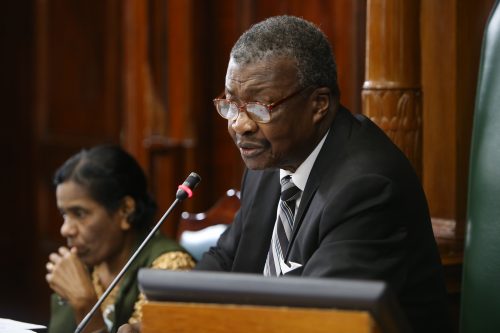Speaker of the National Assembly Dr. Barton Scotland yesterday censured Members of Parliament for unbecoming behaviour.
In an announcement at the start of yesterday’s sitting, Scotland said those who now sit in the parliamentary chamber have been given an honourable tradition to follow. “Our predecessors left us a legacy of decorum and good practice for this House. I ask: What shall we leave our successors?” he said.
Referencing the last sitting, which was held on June 16, Scotland noted that several unprecedented scenes occurred, none of which were a credit to the institution or its members.
“All of them were avoidable and none of them excusable,” he stressed.
“In acting as they did, Honourable Members appeared to show little regard for the honour of this institution. By our conduct, we give the public, on whose behalf we claim to act, at best a poor lesson on parliamentary decorum. Conduct we display has left our citizens to form other than the highest regard for our parliamentary conduct,” he added.

Scotland specifically addressed the actions of Minister within the Minis-try of Natural Resources Simona Broomes. Broomes had recorded a parody of a viral travel vlog compiled by a local social media personality. The minister’s video went viral and became the subject of public criticism.
Yesterday, Scotland referred to it as a new form of disregard for the House. “Recently, the Assembly formed the backdrop for a parody on what is known as Facebook. It was drawn to my attention by a member of the public. An Honourable Member took the Assembly viral,” he said before asking members to think of the legacy they will leave their successors.
Scotland also took issue with the actions of opposition Members of Parliament. He noted that shortly after the House was fully constituted, the then most junior member of the House took to social media to make uninformed comments in reference to the Speaker. “I’m not aware that the Honourable Member has even been called to account for his conduct. In fact, not long after, senior members of the House chose to conduct themselves in similar fashion, making criticisms which involved the Speaker as head of this institution recklessly careless about the truth of their utterances or otherwise,” he said, before adding that the practice has continued whenever some members are displeased with any of his rulings.
During the last sitting, Scotland vacated the chamber for nearly 15 minutes as the PPP/C members refused to follow his directives. This confrontation between Scotland and the opposition members started when opposition backbencher Nigel Dharamlall refused to withdraw his statement that the Govern-ment of Guyana was “decimating” the Indigenous people. Dharamlall had made the statement during his presentation on a motion brought by his colleague, Pauline Sukhai, for the withdrawal of the appointment of a Commission of Inquiry into land rights.
Dharamlall was repeatedly cautioned to withdraw his statement by the Speaker and when he continuously refused, he was asked to take his seat so that the next speaker, Minister of Social Cohesion Dr. George Norton, could make his presentation.
This directive did not find favour with the opposition MPs, who stood en masse in the chamber to protest the action.
Opposition Chief Whip Gail Teixeira took the opportunity to complain about the actions of Minis-ter of Natural Resources Raphael Trotman. According to Teixeira, Trotman launched a verbal attack on Leader of the Opposition Bharrat Jagdeo, which the Speaker allowed to go on. This exchange has also gone viral on social media.
Speaker Scotland, however, stressed that the only way Trotman’s comment could be considered an attack is if the presentation of the “preceding speaker,” Jagdeo, was also deemed an attack.
It is possible, Scotland argued, for persons to be impassioned in their presentations or to make scathing comments in an even tone without either being considered an attack or neither constituting an attack.
He, however, made mention of the lack of civility with which members often address each other, using words that “border on disregard and disrespect.”
“It seems that members have private scores to settle and that they do so when speaking in Parliament,” the Speaker said he was advised by a member of the public.
He reminded members that they have a duty to venerate the House and give evidence of this veneration through their actions.
Scotland also stressed that while he accepts both written and verbal direct communication from members, when members make reference to those communications in public in an effort to gain political points, they must be aware that their conduct could affect that ease of ready communication. “I believe it is possible to inform the public of a decision of the Speaker without drawing the Speaker into any political contention,” he cautioned.









